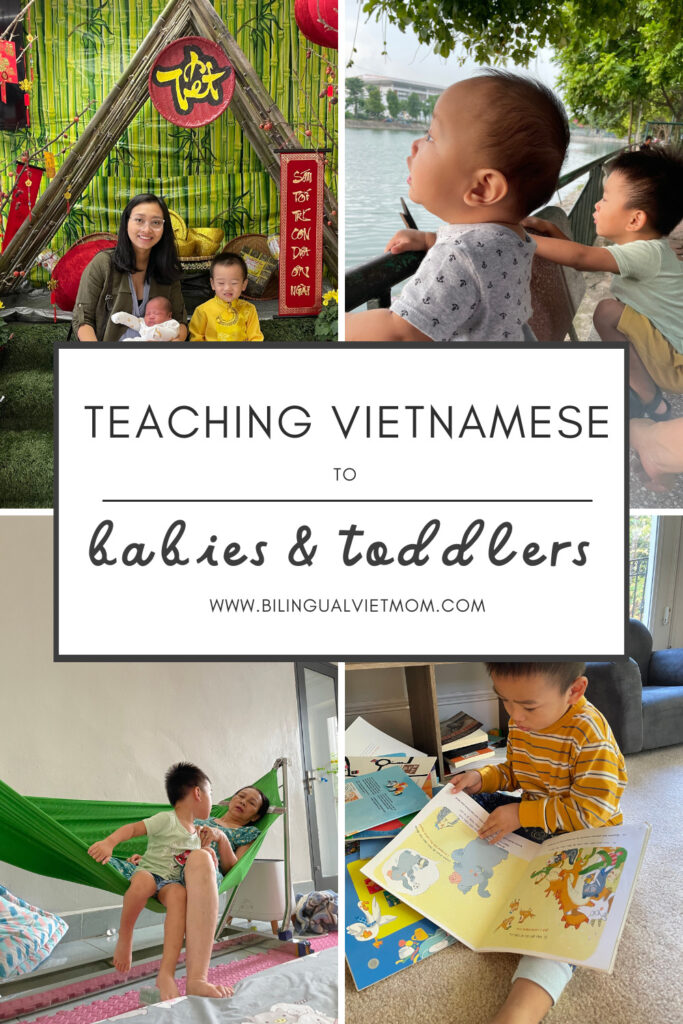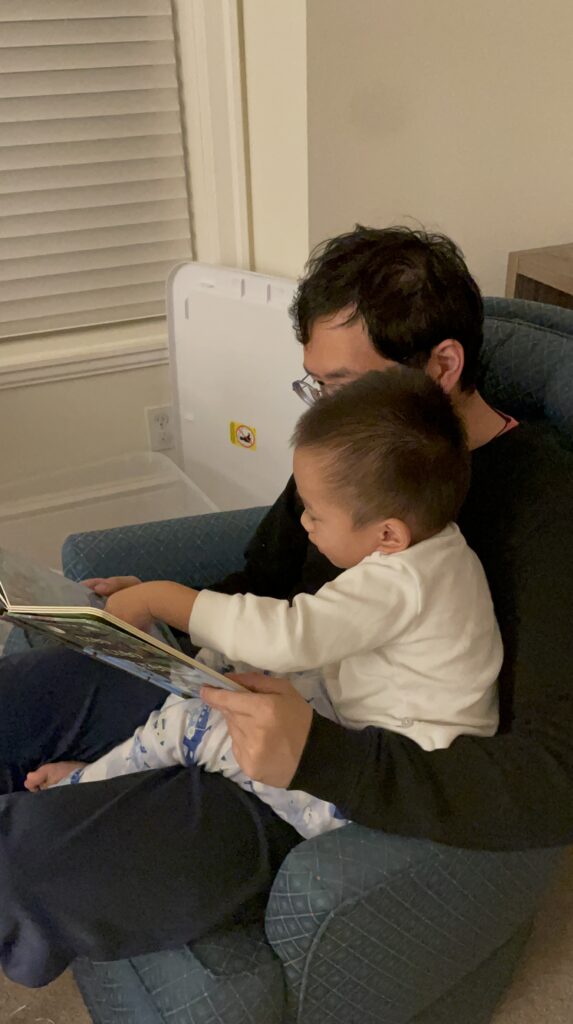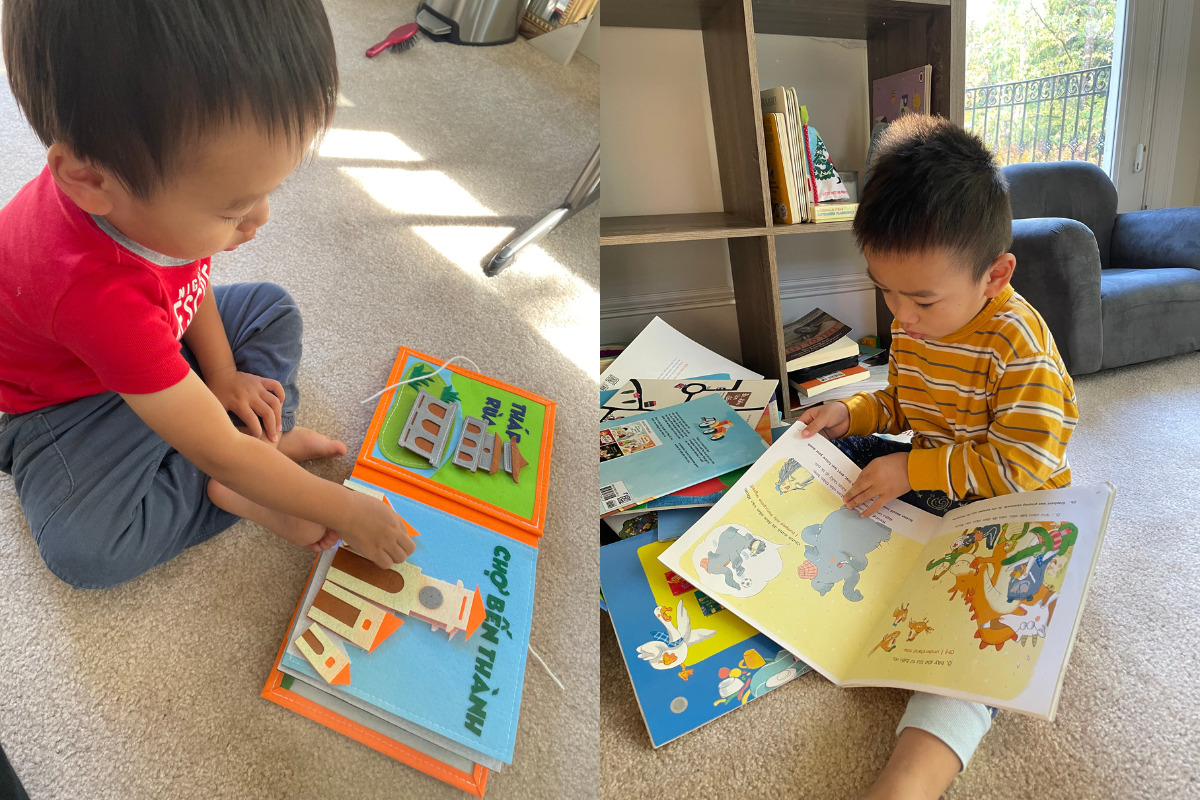How We Teach Vietnamese To Our Kids From 0 to 3 Years Old
Hey there, bilingual Viet parents! I got asked quite a few times by new moms/dads about how to start teaching their little ones Vietnamese. After experimenting with raising bilingual children in the US for 3+ years, I want to share with you what we learned so far, from the perspective of a Vietnamese mom and language teacher.
My sharing is based primarily on our own family’s experience, and partly from observing other Viet or mixed families that we know who live in the US. I assume if you’re reading this blog post, you’re raising bilingual children in a non Vietnamese speaking country. Let me share with you what we’ve been working for us so far.

If you ask my when is a good time to start teaching your kids Vietnamese, I’d say now! If you’re wondering about it, it’s a good time to begin!
We started introducing Vietnamese since the kids were born. At the time of this post, our kids are still very young and don’t know the alphabet yet, so the way we teach them is solely through immersing the language in our everyday life.
We speak Vietnamese at home
You see, I was born in Vietnam and moved to the US after getting married. I speak Vietnamese 100% with the kids. My husband is a Vietnamese American, born in the US. He can speak conversational Vietnamese around daily topics but his native language is English. He also made an effort to speak Vietnamese 90% of the time with the kids. We live with grandparents and they speak Vietnamese 100% too. And that has been the setup in our family from when Leo – our oldest – was born until when he was 3+ years old. Leo was a Covid baby and so for the first two years of his life he basically only knew Vietnamese.
Since our son turned 3 and started going to different parent-child classes, I decided to use English whenever we’re in the classes, just because it’s the language spoken in the classes and it will make it easier for us when participating in the lessons. My husband and I also started to casually homeschool him, teaching him the Vietnamese and English alphabets. And since then, my husband has switched to speaking English to the kids mostly. Leo understands that we speak two languages, and often time now would ask us to translate between the two when he hears a new word. We’ve been doing this for a few months and will see how it goes.
We read Vietnamese books
Reading books is an amazing way to teach kids a language!
We read a ton of Vietnamese children’s books to Leo, and now to Gus – our second son. Since Leo was born, we have been to Vietnam several times, for extended periods (6 months, 3 months, 1 month). Each time we go back to the States, we’d brought with us at least 1 big suitcase of books. We got them from well-known children books publishers and companies like Đinh Tị Books, Ehome, Tủ Sách Gia Đình Nhỏ, Lionbooks, Nhã Nam, Crabbit Books, etc. The majority of these books are picture story books either in Vietnamese or bilingual (Vietnamese-English), and some are interactive books.
After over 3 years, we have now built a selection of family favorites! And we plan on adding more to it over time. If you’re traveling in Vietnam and curious where to shop for children’s books, I will write another blog post to share about this. If you’re interested in getting books for your kids, you can also check out my Vietnamese children’s books subscriptions here.

We teach Vietnamese through play
When Leo got older, I started making simple Vietnamese flashcards of the words he knew. He would play with the flashcards himself and saying them out loud. These were very helpful when his Vietnamese vocabulary grew bigger and he started to encounter more English since starting daycare. Though I had to admit, I got a little too excited and made him a whole Vietnamese alphabet learning binder which he could only play with the first few pages at the time.
We bring the kids to Vietnam
It’s exciting to be in Vietnam because then the kids can understand and talk a lot to everyone! My family (parents, siblings and their children) and extended families all live in Vietnam. We try our best to come back and visit at least once a year. I like to believe that when a language is not just the texts and the books but the culture and the family, it becomes a part of you.
We also live in Seattle where a big community of Vietnamese is, and that’s been wonderful. I just learned that since March 2024, Lunar New Year has officially been recognized as a Washington State’s legislative holiday. In my less than 4 years living in the US, this past LNY was my first time spending Tết here. And I have to say I was impressed! There were quite a lot of LNY events in town including public ones like Tết In Seattle and Hội Chợ Tết at the Vietnamese church as well as more private ones hosted by friends or groups. We find that making friends with other Viet families is a good way to keep the kids connected to the culture and language too.
3 tips about teaching babies and toddlers Vietnamese
Start early! As early as when they’re born!
If you speak Vietnamese yourself, do so! If you’re not so confident about your Vietnamese, also do speak it! My husband told me that thanks to using Vietnamese with the kids, he’s got more comfortable with speaking the language over time. He still makes mistakes, but he’s learning along the way.
Vietnamese books and shows are great tools to teach!
Reading books to children teach them a lot of vocabulary which you don’t necessarily use in daily conversations. And there are quite some fun Vietnamese shows on Youtube if you’re looking for more Tieng Viet content for screentime.
Don’t worry about your kids falling behind in English (or whatever language spoken in your area)
They will for sure catch up with the local language as they grow. Just after less than 2 weeks at his part time daycare, Leo already preferred to use English if we didn’t make an effort to keep Vietnamese at home. And I’ve heard and seen this in many kids!
There you go! I truly hope that our sharing and experience will be helpful to your family. Let me know!
Hoa
